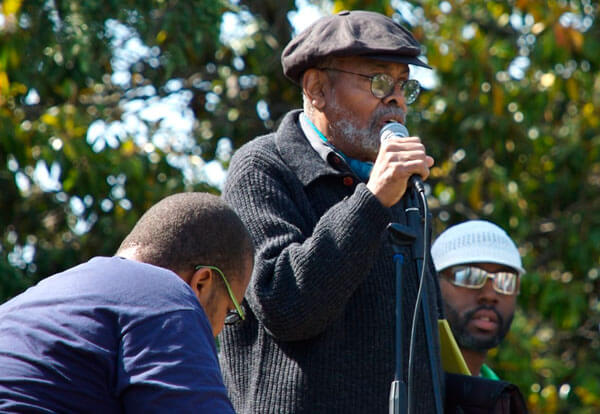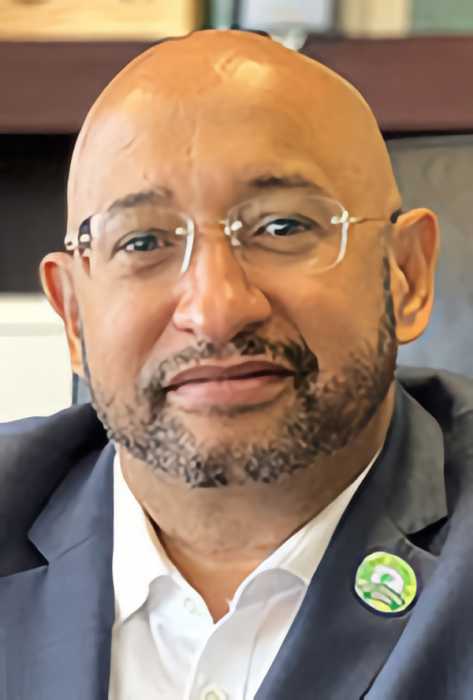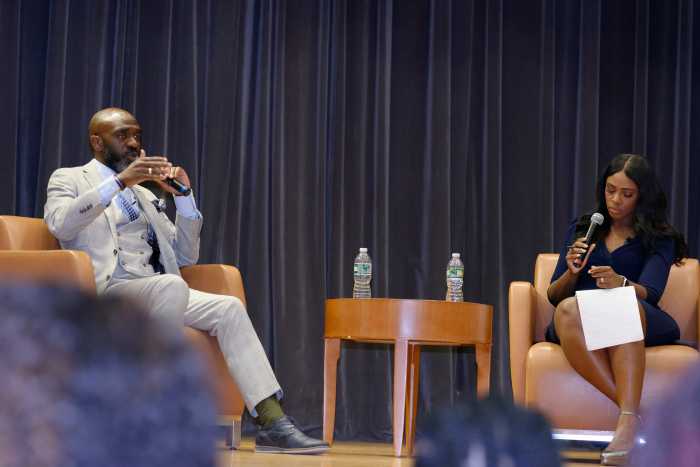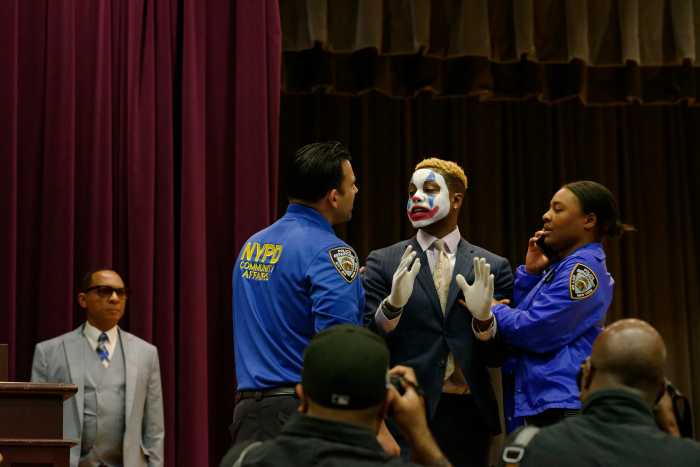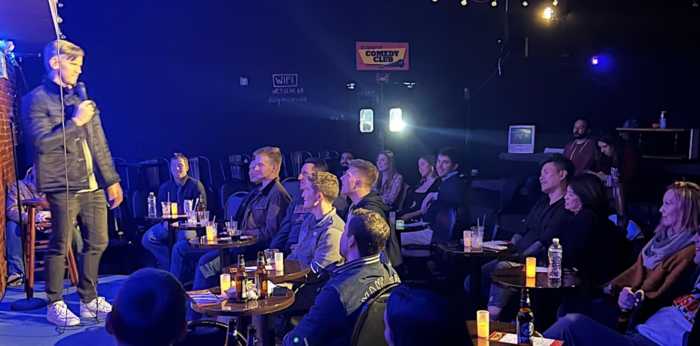Ron Daniels, President of the Institute of the Black World 21st Century, has been assessing the conditions of Blacks throughout the world, and now that the marathon campaign to electing a US president has ended, the distinguished lecturer at York College will convene a State of the Black World Conference IV in Newark, N.J. from Nov. 16-20 to decide a national Black agenda.
Dedicated to the memory of Imamu Amiri Baraka, New Jersey poet Laureate and activist — who died Jan. 9, 2014 — the theme of the five-day confab will adopt the call-to-action title of one of his prolific and challenging poems, “It’s Nation Time.”
Since its publication, the poetry added a permanent reference to the American lexicon to take action.
“In the era of the 1960s, the notion of ‘nation’ conveyed the sentiment and possibilities that Black people could unite to become a formidable force, harnessing our human and material resources to confront white supremacy and to overcome oppression and exploitation,” Daniels explained. “Baraka’s powerful poetic oration challenged Black people from all walks of life to get up and get busy to cultivate the consciousness and commitment to come together to build Black institutions, mobilize and organize movements and fight for our liberation “by any means necessary.”
He said during the era when the poem became regular vernacular “it was an all Black hands on deck” call to action for Black people to join the Black Freedom Struggle and to use whatever we had to achieve victory.”
It’s nation time, get up santa claus
get up roy wilkins,
get up diana ross,
get up jimmy brown
it’s nation time, build it
get up muffet dragger
get up rastus for real to be rasta farari
ras jua
get up nigger get up nigger
come over here nigger
take a bow nigger
It’s nation time eye ime
It’s nation ti eye ime
It’s nation ti eye ime
It’s nation ti eye ime
chant with bells and drum
Its nation time
Baraka taught poetry at the New School for Social Research, literature at the University of Buffalo and drama at Columbia University. He also taught at San Francisco State University, Yale University and George Washington University. He was also a playwright who during the 1960s won a best off-Broadway Obie award for the play “Dutchman.”
Baraka’s son Ras J. Baraka is the current mayor of the city of Newark.
Born the same year his father penned the timely poem in 1970, he is the 40th mayor of the largest city in New Jersey.
For the New Jersey gathering at the Double Tree Hilton at Newark Airport, Daniels has enlisted assistance from an esteemed and diverse group of intellectuals to execute a productive assembly.
Among them: St. Vincent & The Grenadines PM Ralph Gonsalves, former Jamaican Prime Minister. P.J. Patterson, Nation of Islam leader Louis Farrakhan, UWI Vice Chancellor Sir Hilary Beckles, actor Danny Glover , Pan African advocate Dr. Julius Garvey, originator of the Kwanzaa celebration, Dr. Maulana Karenga , former Essence Magazine editor Susan Taylor, Pan-African advocate and lecturer Prof. Leonard Jeffries, Founder of the Christian Times, Rev. Dennis Dillon, poet, publisher and poet Haki Madhubuti, poet Sonia Sanchez, author, economist and social commentator Dr. Julianne Malveaux and Grenadian intellectual and journalist Don Rojas along with many more distinguished names.
“It is time for a convergence of some of the most visionary and powerful movements, scholar-activists, organizers, institution-builders, opinion-makers, a new generation of freedom fighters, conscious and concerned Black people, African people from the U.S. and the Pan African world to network, share information, love and learn from each other to forge a more unified and formidable movement to fight for a new future for our people.”
Daniels said during panel discussions they will examine and discuss topics — “Analyses of the Crises that Afflict Black Families,” “Communities and Nations and Examine Strategies,” “Initiatives and Models for Healing and Black Empowerment” and throughout the process “Strengthen Bonds of Cultural, Social,” and the “Economic and Political Unity Between Africa and the Diaspora.”
Opening day discussions include a symposium on “the Future of Democracy and Development in Africa, the Caribbean, Central and South America.”
Perhaps most anticipated is the analysis and dialogue about the “Implications of the 2016 Presidential Election for Black America and the Pan African World.”
Other topics slated for discussion include: “Religion, Spirituality and Liberation,” “Culture and Education for Black Survival and Development Economic Development for Black Empowerment,” “Sustaining and Enhancing the Black Family,” “Beyond the War on Drugs: Healing Black Families and Repairing Black Communities,” “Pan African Institute and Reparations,” “the Black Lives Matter Movement,” and a hip-hop work session.
In addition, the organizers will launch an initiative to mobilize 2,000 African Americans, Haitian Americans and friends of Haiti for a Pilgrimage of Hope to the embattled French creole landmark next year.
Organized prior to the recent devastation by Hurricane William, IBW previously on several occasions delivered ‘care’ relief to the island.
In an effort to continue the mission of aiding Haiti, the IBW will launch a humanitarian and development cruise to provide human and material support for the world’s first Black Republic via the Haiti Support Project’s Model City Initiative.
Enthusiastic about the prospect of serious discussions with progressive registrants to the upcoming conference Daniels added: “The State of Emergency still persists in Black America and indeed in the Pan African world, but there have also been dramatic changes over the past four years which will serve as the context for what will be one of the great gatherings of Black people in the 21st century.”
“In the name of our ancestors, let the organizing and mobilizing begin!”
Fists Up For 47th Annual Black Solidarity Day
The Black fist has always held significance among youths in America.
During the early 1960s, the Black Panthers were mostly identified as a radical, revolutionary group when they gestured using one right hand and advocated a “Power ToThe People” mantra that all but scared conservative white Americans.
Most memorable also is the high-fisted stance taken by track and field Olympians John Carlos and Tommie Smith in Mexico City, Mexico when they took to the winners’ podium and raised the salute.
How it irked one segment of the society yet inspired pride and admiration in another.
That was 1968.
A year later, Panamanian, Brooklyn College Prof. Carlos Russell instituted a Black Solidarity Day.
The day demanded an absence from work, school and shopping.
Observed on the first Monday in November, students and progressives embraced the one day dedicated to Black expression of unity and purpose.
According to the Wells College’ web portal BSD “As a concept, it derives from the play, ‘Day of Absence’ by Douglas Turner Ward. The day is based on the extreme social, political, and economic consequences that would ensue if all Black people were to disappear for one day.”
Forty-seven years later, Monday, Nov. 7, BSD prevails and was evident on many college campuses. From Yale University to CUNY campuses, the eve of the presidential elections marked the significant day of observance.
At Medgar Evers College in Brooklyn, an all-day program of reflection and commemoration billed “The Power of Protest” featured spoken word, music, real talk and cultural presentation “dedicated to those who were harmed by violence or police brutality.”
An open mic session and workshop enabled dialogue.
“Black Solidarity brings justice to everyone. Injustice anywhere, is injustice everywhere,” formed the basis for conversation spearheaded by the Black Lives Matter Movement.
The tradition of wearing black still persists and on some campuses students chose to wear tape over their mouths as if in silent protest.
Political pundits reported that millenials played a pivotal role in the recent election the day after. Apparently like reggae singer Bob Marley, more than a few had “so much things to say.”
Catch You on the Inside!


